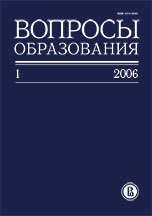Ключевые слова:
бюджетирование, оценка деятельности организации, результаты деятельности образовательных учреждений, ориентированное на результат
Данные скачивания пока не доступны.
Опубликован
2010-12-31
Как цитировать
Тамбовцев, Виталий. 2010. «Конечные результаты отрасли образования и проблемы их измерения». Вопросы образования / Educational Studies Moscow, вып. 1 (декабрь), 5-24. https://vo.hse.ru/article/view/15017.
Выпуск
Раздел
Образовательная политика
Язык
Ключевые слова
Информация
Вопросы образования / Educational Studies (Moscow)
Ежеквартальный научно-образовательный журнал
Издается с 2004 года
Свидетельство о регистрации средства массовой информации ПИ № ФС 77 - 68125 от 27.12.2016
Выдано Федеральной службой по надзору в сфере связи, информационных технологий и массовых коммуникаций








